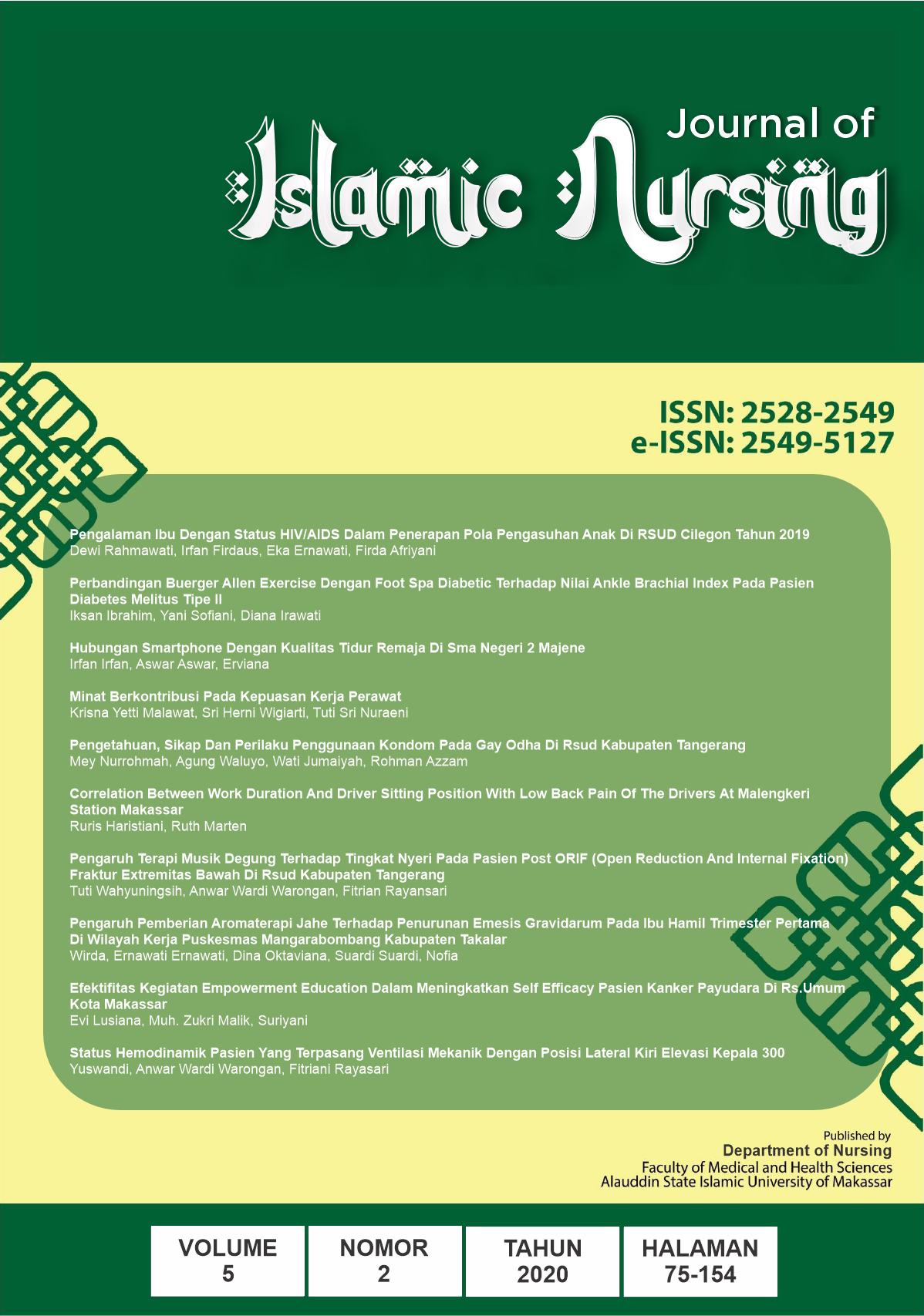EFEKTIFITAS KEGIATAN EMPOWERMENT EDUCATION DALAM MENINGKATKAN SELF EFFICACY PASIEN KANKER PAYUDARA DI RS.UMUM KOTA MAKASSAR
Abstract
Breast cancer is a problem that often occurs in women both in developed and developing countries. For this reason, it is necessary to prevent the increasing mortality rate, one of which is by increasing self-efficacy which can be achieved by providing advice, information and motivation with empowerment education. Based on this, the researchers conducted this study with the aim of knowing the effect of empowerment education in increasing the self-efficacy of breast cancer patients. The research method used is a quantitative study with a one group test approach. The results obtained are from 5 (five) items of self-efficacy, 3 (three) items that have changed, namely self-confidence in getting information about illness / complaints experienced (p: 0.023), receiving help from the community, family and friends (p. : 0.02), and treats breast cancer disease and symptoms (0.041). Based on these results it can be concluded that empowerment education activities should be one of the activities of providing nursing interventions to breast cancer patients.
Keywords: Empowerment Education; Self Efficacy; Breast cancer
Downloads
References
DAFTAR PUSTAKA
Akin, S., Can, G., Durna, Z., & Aydiner, A. (2008). The quality of life and self-efficacy of Turkish breast cancer patients undergoing chemotherapy. European Journal of Oncology Nursing. https://doi.org/10.1016/j.ejon.2008.07.006
Alligood, M., 2014. Nursing Theory & Their Work.8th ed. Missouri: Mosby Elsevier Inc, The CV Mosby Company St. Louis, Toronto.
BorjAlilu, S., Kaviani, A., Helmi, S., Karbakhsh, M., & Mazaheri, M. A. (2017). Exploring the Role of Self-Efficacy for Coping With Breast Cancer: A Systematic Review. Archives of Breast Cancer, 4(2), 42–57. https://doi.org/10.19187/abc.20174242-57
Br. Sitepu, Y. E., & Wahyuni, S. E. (2018). Gambaran Tingkat Stres, Ansietas Dan Depresi Pada Pasien Kanker Payudara Yang Menjalani Kemoterapi di RSUP H. Adam Malik Medan. Talenta Conference Series: Tropical Medicine (TM), 1(1), 107–113. https://doi.org/10.32734/tm.v1i1.50
Dinas Kesehatan Provinsi Sulawesi Selatan, 2017. Diakses dari http://dinkes.sulselprov.go.id/opd/index/dinkes. Diakses tanggal 13 Agustus 2019.
Foster, C., Breckons, M., Cotterell, P., Barbosa, D., Calman, L., Corner, J., … Smith, P. W. (2015). Cancer survivors’ self-efficacy to self-manage in the year following primary treatment. Journal of Cancer Survivorship. https://doi.org/10.1007/s11764-014-0384-0
Gale, D., 2000. Rencana Asuhan Keperawatan Onkologi. Jakarta :EGC
Hergenhahn, B.R.; Olson, Matthew H. (2008.). Theories of learning = (Teori belajar) / B.R. Hergenhahn, Matthew H. Olson. Jakarta :: Kencana Prenada Media Group,.
Lusiana, E., Kadar, K., & Bahar, B. (2019). Analisis Hubungan Pemahaman Diabetic Literacy Dengan Self Management Pada Pasien Diabetes Melitus Di Rs. Universitas Hasanuddin Makassar. Link, 15(1), 18. https://doi.org/10.31983/link.v15i1.3963
Lusiatun, Mudigdi, A.,Murti, B. (2016). The Effect of Self Efficacy, Family Support, and Socio-Economic Factors on the Quality of life of Patients with Cancer at Dr Moewardi Hospital, Surakarta. Journal of Epidemiology and Public Heath 2016, 1(3):182-194. https://doi.org/10.26911/jepublihealth.2016.01.03.05
Masraroh, L. (2012). Meningkatkan Self-efficacy Melalui Bimbingan Kelompok Teknik Modeling. Pendidikan, 1(1), 84–120.
Notoatmodjo S.2010. Konsep Perilaku dan Perilaku Kesehatan. In : Notoatmodjo S. Promosi Kesehatan dan Perilaku Kesehatan. Jakarta: PT Rineka Cipta
Polit DF, B. C. (2014). Quantitative Descriptive Studies. In Essentials of Nursing Research: Appraising Evidence for Nursing Practice. 8.
Resnick, B. (2011). Self-efficacy. In Middle Range Theories: Application to Nursing Research: Third Edition. https://doi.org/10.4324/9781315652535-5
Rias, Y. A. (2016). Hubungan Pengetahuan dan Keyakinan dengan Efikasi Diri Penyandang Diabetic Foot Ulcer. Jurnal Keperawatan Muhammadiyah, 1(1), 13–17.
Salkind, N.J. 2009.Teori-teori Perkembangan Manusia / Neil J. Salkind .Nusa Media : Bandung
Tarigan, R., Milfayetty, S., & Irawani, N. (2015). Pengaruh Bimbingan Kelompok Peer Group terhadap Efikasi Diri dan Self-Regulated Learning. Analitika.
Wood. G.L.& Haber, Judith. 2010. Nursing Research-Methods and Critical Appraisal for Evidence Based Practice. 7th ed. Elseiver. China
Zimmerman, B. J. (2010). Self-efficacy and educational development. In Self-Efficacy in Changing Societies. https://doi.org/10.1017/cbo9780511527692.009
-, Y. (2017). Peer Education On Leprosy Eradication In Gowa Residence, South Sulawesi (Eradikasi Penyakit Kusta Melalui Peer Education Di Kabupaten Gowa Provinsi Sulawesi Selatan). Edutech. https://doi.org/10.17509/edutech.v15i3.4


